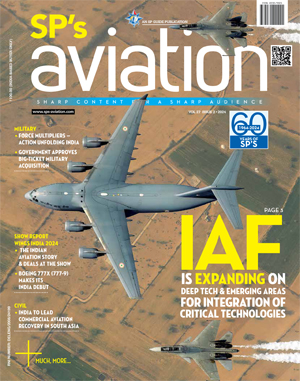INDIAN ARMED FORCES CHIEFS ON
OUR RELENTLESS AND FOCUSED PUBLISHING EFFORTS

SP Guide Publications puts forth a well compiled articulation of issues, pursuits and accomplishments of the Indian Army, over the years

I am confident that SP Guide Publications would continue to inform, inspire and influence.

My compliments to SP Guide Publications for informative and credible reportage on contemporary aerospace issues over the past six decades.
Prime Minister Modi in the United Nations
Prime Minister Narendra Modi has been able to convey that he is a pragmatic visionary; not only for India and the South Asia region but also at global level. The international community will have to take greater notice of him hereafter, and more importantly, with that of India.
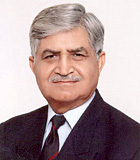 |
By General V.P. Malik (Retd) Former Chief of the Army Staff |
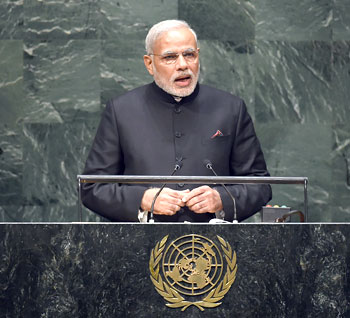
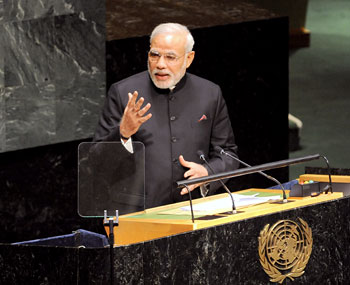
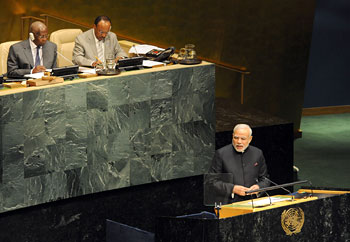
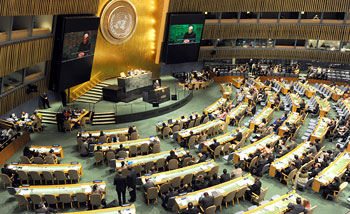
the 69th Session of the United Nations General Assembly,
in New York.
It is not easy to knit together India’s cultural heritage, domestic and regional challenges with those of the globe in a 32 minutes address to nearly 200 heads of nations who had congregated to visualize the ‘post-2015 development priorities to determine the nature of internal cooperation and allocation of resources.’
That is what India’s Prime Minister Narendra Modi did in his maiden address in the United Nations General Assembly on September 27, 2014. This was done with a candid exposition of where the world has gone wrong and how it needs to move forward on key global issues. With that address, he made it clear that he had arrived as a global statesman and was keen to make a difference!
Right in the beginning, Modi made his status and position clear to the global gathering as a political leader responsible for one sixth of global humanity living in India, and with India’s ancient philosophy of ‘Vasudhai Kutumbkam’ (the world is one family!).
Only two of his 32 minutes speech was spent in responding to Nawaz Sharif’s lament on India, particularly on Kashmir, made a day earlier. It was not just a snub or a rebuff. It was also a non- acrimonious advice on the right approach to resolving bilateral issues, without missing out the humanitarian aspect. He made it clear that “Raising Kashmir at UN will not resolve bilateral issues... A nation’s destiny is linked to its neighborhood. I am prepared to engage in a serious bilateral dialogue with Pakistan in a peaceful atmosphere, without the shadow of terrorism. Pakistan must also take its responsibility seriously to create an appropriate environment.”
As expected, the longest part of his speech was on countering terrorism. Having suffered terrorism since long, India has been an active participant in all UN discussions. It played an important role in framing of UN Security Council Resolution 1373 (2001), 1456 (2003), as a member of the Counter Terrorism Implementation Task Force and on the UN Global Counter Terrorism Strategy and Comprehensive Anti-Terrorism Convention thereafter. India had recommended giving more teeth to the Counter-Terrorism Committee to enforce implementation and to deal with non-compliance. Prime Minister Modi pointed out the faults in the implementation of counter terrorism strategy. He demolished attempts by interested parties in dividing terrorism into ‘good terrorism’ and ‘bad terrorism’, nations such as Pakistan allowing sanctuaries on their territory and using terrorism as an instrument of state policy, and non-appreciation of terror linkages within and across regions. He exhorted global cooperation, pointing out that compartmentalized national approaches can not deal with the seamless web of international linkages which terrorism has developed.
His second major thrust was on ‘global partnership and cooperation’ in facing challenges. “One country and or group of countries can not determine the course of the planet”, he said. He mocked at unilateralism, G-4, G-7, and G-21 as outdated and ineffective groupings. “Institutions that reflect the imperatives of 20th century will not be effective in the 21st century”, he said, and as a global statesman, he pronounced that “G-All” was the right approach.
Right in the beginning, Modi made his status and position clear to the global gathering as a political leader responsible for one sixth of global humanity living in India, and with India’s ancient philosophy of ‘Vasudhai Kutumbkam’ (the world is one family!).
With that he also wove the urgent requirement of the long awaited UN reforms ‘to make it (the UN) more democratic and participative’. He asked global powers not to indulge in a zero-sum game preventing genuine reforms in the UN. He strengthened demand for India’s permanent membership in its decision making body by lauding peacekeeping role of nations who have participated and sacrificed soldiers (India till date has contributed nearly 200,000 soldiers of which nearly 175 have made supreme sacrifice) and not just contributed dollars.
Modi’s speech was forthright and forward looking, which also reflected India’s national interests. He did not shy away from the contentious issues in which India is known to have difference of opinion with China and the USA. Hinting towards China, he said that “Even without any major wars, there is an absence of real peace. An integrating Asia Pacific region is still concerned about maritime security that is fundamental to its future.” Despite differences on ‘Climate Change’ with the US, he included this issue amongst the global challenges. He reminded the gathering of the Kyoto Protocol and said, “The world had agreed on a beautiful balance of collective action-common but differentiated responsibilities. That should form the basis of continued action. This also means that the developed nations must fulfill their commitments for funding and technology transfer. He also stated that cyber and space were new instruments of prosperity, which could also turn into new theatres of conflict.
With his address in the United Nations General Assembly on September 27, 2014, Prime Minister Narendra Modi has been able to convey that he is a pragmatic visionary; not only for India and the South Asia region but also at global level. The international community will have to take greater notice of him hereafter, and more importantly, with that of India.





